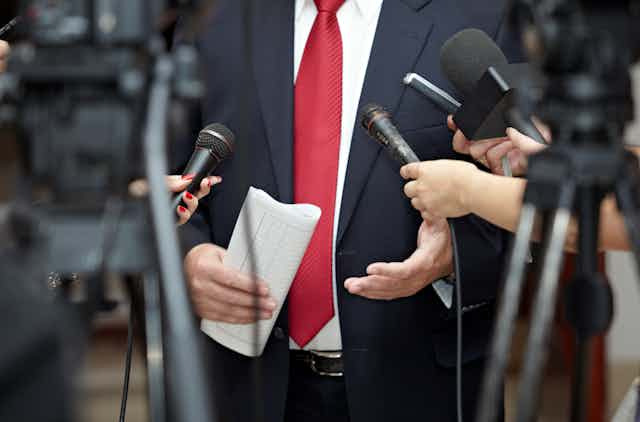As countries across Europe and around the world grapple with high living costs and impending recession, voters are concerned about the economy and how their elected representatives will fix it.
For many, it’s tempting to call on politicians to cede some of their power to economic experts. Politicians might be more able to make difficult or unpopular (but necessary) decisions if they could argue they were following expert advice, as they did during the pandemic.
But our new research reveals what politicians, when asked in private, really think about economists. Our team at UCL conducted nearly 100 in-depth interviews with economic ministers, opposition spokespeople and economic committee members. They were from five countries – France, Germany, Denmark, the UK and US – and across the party spectrum from the right-wing Alternative fur Deutschland to the French Communist party.
Across the board, politicians reported declining respect for economists since the 2008 financial crisis. And they were concerned that any increased reliance on such experts would alienate voters.
Very few politicians saw economists as experts in the way public health or other “hard scientists” are experts. They usually supported one specific group of economists rather than the discipline as a whole. Centre-left politicians tended to say the only economists they respect are “Keynesian”. They argued that John Maynard Keynes’s approach “allows us politicians to intervene” to promote greater socioeconomic equality.
Far-left politicians proclaimed the value only of non-mainstream economists, such as environmentalist Kate Raworth, who argues the planet’s resources are finite and growth not always desirable.
Centre-right politicians mentioned Friedrich Hayek most often, best-known for defending free-market capitalism. They also described having respect for other “free market economists”.
Losing usefulness
Even politicians who had the utmost respect for mainstream economists most of their working lives found them less “useful” since the 2008 financial crisis. One British centrist politician told us that until 2008, “the economy worked almost like clockwork”. After the crash, people’s trust in the standard economic model was shattered, not just by the crisis itself, but by economists’ failure to predict it.
Those in office during the crisis consulted economists who were often divided. After they left the room, the politicians felt they were alone in “shouldering responsibility”. Very often they felt their greater knowledge of their constituents’ everyday circumstances meant they had a surer sense than the experts of whether something like a car scrappage scheme would restore confidence. They felt similarly alone as they charted how to get economies out of lockdown or through the supply chain crisis.
As well as viewing economists as less united and therefore less “scientific” than other experts, politicians complained they are often impractical, operating at too abstract a level and relying on mathematical modelling rather than real-world conditions. They may seek out an economist working on a specific policy area they need to explore. But only if the work they have done has been tested in the real world, and the economist is one of the rare breeds that can explain in accessible terms.
We found a greater integration of politicians and economists in Denmark’s consensual political system, where many parties share the same commitment to a Scandinavian welfare model of the economy and coalition is the norm. But in the US (where we might expect high levels of respect for economists, having pioneered the field) politicians had arguably the lowest respect for them. They labelled them by political party – “Republican” or “Democrat” – and said they use them to add value to their arguing points.

The politicians we interviewed also worried that turning to economic experts would make voters more distrustful. They thought past attempts to separate economics from the political arena – for instance, giving more power to central banks – confused and estranged voters who then turned to populist politicians offering simplistic solutions.
In the US, Republicans were privately horrified that President Donald Trump had “demagogued” economic issues. They had spent decades carefully crafting consistent and coherent economic messaging on the virtues of free trade and balancing the budgets, only for him to tell voters that protectionism would bring back rust belt production jobs and cutting their taxes could be paid for out of increased borrowing.
Meeting voters where they are
As economic issues rise up the agenda for voters, many politicians welcomed the prospect of turning away from more cultural issues like immigration. But they recognised that if they are not prepared to outsource economic policy problems to economists they will have to explain their own policies more effectively to voters. They need to economically educate voters – not in a formal sense, but at least by being more in-depth and open.
Voters find economic issues more technical than social and cultural ones. As one French Socialist put it, they “turn off” because they doubt they will be able to understand. But, he said, politicians have to appeal to voters’ intelligence and urge them to make the effort to understand. His ideal situation would be if voters were informed enough to “qualify” their judgements more, saying things like “well, it could have been worse”.
Politicians have to prepare the ground by starting where voters are. One free trade Republican described using chocolates to illustrate how Trump’s tariffs made aluminium wrappers more expensive. Another said he regularly visited factory workers in their lunch hour for a question and answer session to explain his economic thinking.
Another often overlooked barrier is that politicians often have moral economic goals, whether left-wing visions of social justice or right-wing visions of the value of unleashed markets. But they are inhibited in describing them to voters because they think there is a gulf between them and voters, who they see as narrowly self-interested. Our research urges them nevertheless to be more open about their thinking with voters. If they want to earn trust on economic policy, they will have to be more honest about what they are trying to achieve.

